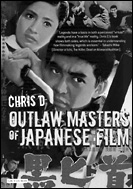Outlaw Masters of Japanese Film
by Tom Mes
Any Japanese film fan based on the U.S. West Coast, and probably quite a few from other parts of the country, will know the American Cinematheque. For years, its programmers Dennis Bartok and Chris D. have been showing some of the rarest and most glittering gems of Japanese genre cinema in their Outlaw Masters of Japanese Film series.
The two men have done pioneering work in bringing Japanese film to American audiences, in many cases paving the way for full-scale DVD releases of such prize offerings as Shunya Ito's breathtaking Female Convict Scorpion: Jailhouse 41, Yasuharu Hasebe's delirious Black Tight Killers and a plethora of films by true masters Kinji Fukasaku and Seijun Suzuki. Fans all over the world, far beyond the U.S.A., have a lot to thank this intrepid couple for.
Chris D. now extends his activities to books. This, the official Outlaw Masters of Japanese Film tome, spotlights 14 filmmakers (twelve directors and two actors) who personify the author's image of outlaw artists, each covered here with an essay, a filmography and an interview. D.'s definition of an 'Outlaw Master' is rather loose, meaning that the selection does come across as somewhat eclectic to say the least. The subjects range from 1960s studio taskmasters like Kazuo Ikehiro, via New Wave acolyte Masahiro Shinoda, pink pioneer Koji Wakamatsu, contract players from Toei's golden age of exploitation Sonny Chiba and Meiko Kaji, right down to contemporary genrebusters Takashi MiikeTakashi Miike and Kiyoshi Kurosawa, and quite a few in between.
When applied to a single-volume book, this very flexible definition does get a bit problematic. Only Chris D. knows what exactly constitutes an 'outlaw filmmaker'. In the introduction he defines the term as "directors coming out the Japanese movie production lines of the late fifties, the sixties and the early seventies: genre filmmakers who made genre movies [...] but who pushed the envelope beyond the usual conventions in some way [...]; or filmmakers who simply, in the tradition of the great American pulp directors [...] just made damn fine, fast-moving pictures". It's not the most workable and clear delineation, and one that's built predominantly on a very subjective view, a feeling more than anything else. D. even adds a bibliography of books on non-film related "outlaw subjects", among which he counts the yakuza and rebel women. Perhaps the phrase is simply meant as an alternative to the equally slippery, and overused, term 'cult', but the impression one gets from this book is that it's more about one American fan's personal obsessions than about the Japanese film industry.
This elusiveness marks, and mars, most of the profiles of the 14 personalities Chris D. presents in this volume. Each chapter consists of an essay, a filmography and an interview, but little effort is made to place the filmmakers and their work within a proper context, either socio-historical or industry-wise. The 'Outlaw' tag effectively keeps the author from investigating a little deeper into the circumstances that shaped these people and their films. This is most clearly felt in the short essays on each filmmaker, which for the most part consist of a succession of paragraph-long synopses of selected films, interspersed with an occasional brief personal remark by the author but with little attempt at providing real context. These people may have pushed the envelope, but unfortunately the essays rarely make us understand why. The more obscure directors fare best; men like Eiichi Kudo and Kazuo Ikehiro have never been covered in even the slightest manner in English texts, so D's contributions are more than welcome.
There are also a few issues with the filmographies, like the loose translations of Japanese titles that are presented as if official, causing more confusion than clarity. And surely it wouldn't have taken that much more effort to present complete instead of selective filmographies for 14 people? On the other hand, just like with his work at the American Cinematheque, D. deserves praise for unearthing scores of films that have thus far gone completely unnoticed in the West but which look positively mouth-watering: Eiichi Kudo's student riot allegory in samurai garb The Great Killing, Kazuo Ikehiro's nihilistic, Yoshio Harada-starring Trail of Blood trilogy, and Yasuharu Hasebe's late-period Nikkatsu noir Bloody Feud to name but three.
More than this, the interviews with each of the 14 luminaries are without exception fascinating, revealing and fact-filled, with the author asking perceptive and probing questions. Some, like the ones with Fukasaku, Wakamatsu and Kurosawa, are excellent, even when their source initially begs a degree of scepticism (the Kurosawa interview is actually a collection of audience Q&A sessions, but forms a tremendous read nonetheless).
All things considered, Outlaw Masters of Japanese Film offers a handful of good introductory pieces on overlooked directors, fourteen very fine interviews and plenty of pointers to tantalising titles, but it does leave you with a lingering sense of unfulfilled potential. Chris D. freely speculates about further Outlaw Masters books and is still working on his long-on-the-making Gun and Sword: An Encyclopedia of Japanese Gangster Films. A little bit more effort and focus could make those tomes the standard works that Outlaw Masters of Japanese Film unfortunately fails to be. Because the author's love and enthusiasm for these films remain beyond question.
